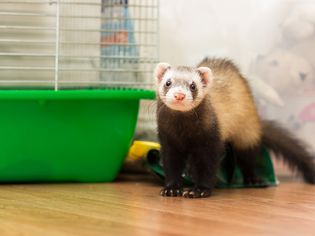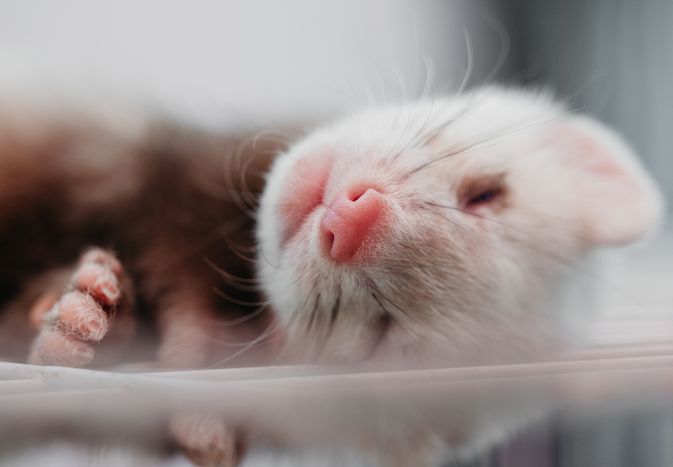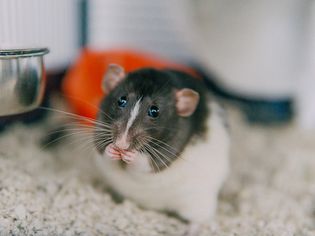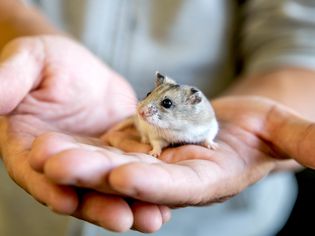Itching and Scratching in Rabbits
Rabbits shouldn't scratch themselves any more than you would. If your pet rabbit seems excessively itchy and scratches a lot, it has a problem that needs to be addressed. Various issues—from mites to allergies—can cause a rabbit to itch and scratch, but fortunately, these are treatable.
Why Do Rabbits Itch and Scratch?
When an animal experiences severe itching and scratching, it's called pruritus. In a rabbit, it can be due to fur, skin, or ear parasites; dry skin; allergies; or infections. No matter the cause, it's important to take care of it right away for the sake of your rabbit's health and peace of mind.
Fur Mites
Cheyletiella parasitivorax are microscopic mites that live in the fur of rabbits. Cheyletiella mites are blood-sucking parasites that bite your rabbit in order to feed, which causes it to itch and scratch.
Fur mites are also referred to as "walking dandruff," because they're often seen moving the dead skin around on rabbits, creating the appearance of mobile skin cells. They may start off in a small area on your rabbit, but if left untreated, they can spread all over its fur, into the environment in which they live, and to other rabbits and pets.
Even if your rabbit never goes outside, it can get fur mites from food or bedding that you bring into your home.
Lice
While not as common as some other parasites, lice do infest rabbits. They're species specific, so humans and other nonrabbit pets can't get them.
Fleas
Many people don't think that rabbits can get fleas, but they can. Fleas, like fur mites, are blood-sucking parasites that bite rabbits, which, in turn, causes them to itch and scratch.
Female fleas lay up to 50 eggs every day, so even if you only see one or two adult fleas on your rabbit, they've probably already laid hundreds of eggs. Fleas also bite humans, but female fleas usually can't produce viable eggs when human blood is their only food source.
Indoor rabbits can get fleas just like outdoor rabbits. Other pets in the household can give your rabbit fleas and they can be tracked in from the outdoors. Fleas can also find their own way into homes just like other insects, such as ants.
A flea comb will help you find fleas and flea dirt. Flea dirt is the cylindrical feces that turn red if rubbed with a wet cotton swab. This is a good trick for distinguishing the digested blood from normal environmental dirt.
Dry Skin
Your rabbit may develop dry skin, which can make it itch and scratch. Rooms with very low humidity, dusty environments, poor diets, and bathing your rabbit too often or using inappropriate shampoos can all contribute to dry skin in your pet. If you can determine the cause of the dry skin, then you should be able to reverse it. For temporary relief, ask your vet to recommend a rabbit-safe spray product.
Ear Mites
Psoroptes cuniculi are ear mites that cause itching and scratching. They can be spread from rabbit to rabbit, so wash your hands after handling a rabbit with itchy ears. You may notice hair loss around the ears and/or scabs, or the rabbit's ears may look especially dirty. A head tilt, flopped ear, and head shaking are also signs of an ear mite infestation, which doesn't always affect both ears. If you notice any of these signs, take your rabbit to see the veterinarian.
Allergies
Just like people, some rabbits are allergic to certain substances that cause them to itch and scratch. Usually, these allergies are environmental and not food-based, so you can make changes to bedding, litter, cleaning solutions, and air purifiers to make your rabbit more comfortable at home.
Common environmental allergens include the dust in certain litters or in the rabbit's hay, as well as laundry softeners and detergents used on blankets.
Rabbits can also be allergic to parasites such as fur mites and fleas. This will make an infestation of these pests even more irritating to your pet.
Skin Irritants
In addition to allergies, rabbits may be irritated by certain products, especially if they aren't meant for rabbits. Shampoos, conditioners, sprays, and air fresheners may all cause skin irritation in your rabbit. If you use a new product, such as a shampoo, and the next day your rabbit is itching, it may be because it was too harsh for your rabbit's skin. This is often the case with products meant for dogs that are used on rabbits.
Ringworm
Caused by two main types of organisms (Trichophyton mentagrophytes and Microsporum canis), ringworm is a fungal infection that causes hair loss, itching, and red "ringworm" lesions in rabbits. People can also contract ringworm from a rabbit.
The main cause of ringworm, as well as mites and fleas, is direct contact with an infected rabbit. When you bring a new rabbit into your home, keep it separate from your other rabbits until you're sure it doesn't have an infection. Rabbits can also contract ringworm from dirty environments and brushes that were used on an infected rabbit.
Skin Infections
Urine scald and feces that have remained in prolonged contact with your rabbit's skin and generally unclean environments may cause your rabbit to develop a skin infection. The infected area may become red, inflamed, and very itchy and should be treated right away.
Treatment
The methods used to treat a rabbit's itching and scratching depend on the cause. However, a number of problems are solved through the same means.
- Fur mites are highly contagious to other rabbits. If you have other pets in your house and your rabbit is diagnosed with Cheyletiella mites, take care not spread these parasites to other animals. Wash your hands after handling your rabbit and throw away the food and bedding in its cage.
- For fur and ear mites, lice, and fleas, freeze all unused food and bedding that you purchased from a pet store or online. The parasites can be brought into your home with such items, so freezing them before use is also a good way to prevent an infestation.
- If your exotics vet diagnoses your rabbit with mites, she will most likely prescribe a medication such as Selamectin, which will kill the infestation without harming your rabbit. Over-the-counter products are typically not safe for rabbits, and you should always consult your veterinarian prior to administering such products.
- If you find fleas or flea dirt on your rabbit, treat your rabbit and all the other furry pets in the household with a safe medication, just as you would for fur mites. You will also need to clean and treat the environment. Some rabbit owners use boric acid powder in their carpeting and various flea sprays and bombs sold at pet stores. If you choose to use these products, make sure your rabbit is out of the room you're treating for at least 24 hours.
- If your rabbit has environmental allergies, use fragrance-free fabric softeners and detergents meant for babies or sensitive skin to wash its blankets. If symptoms continue, look to other possible allergens in your rabbit's environment—for example, dust or pollen from an open window in spring or summer—and try to correct these.
- Ringworm is usually treated with topical ointments or oral medication prescribed by your exotics vet.
- Skin infections typically require prescription medications. An anti-itch spray is available that's safe to use on rabbits, but if the root of the problem isn't addressed, the spray merely provides temporary relief.
How to Prevent Itching and Scratching
Often, your rabbit's itchiness can be prevented by keeping its environment clean. The freezing recommendation for any rabbit supplies is an excellent place to begin as is the use of fragrance-free laundry products for any washable rabbit bedding.
Beyond these, be sure that your rabbit's cage is as clean as possible. Daily and weekly upkeep can make a significant difference in the health of your pet and prevent many skin infections. When bathing your rabbit, use only products designed specifically for rabbits.
It's also a good idea to regularly examine your rabbit's fur. This will help you to easily recognize any abnormalities and take treatment steps immediately, which can prevent an infestation, ear, or skin problem from getting worse.
At the same time, take precautions for any other pets in your home, using products such as flea preventives on a regular basis. Take care about exposing your rabbit to other animals that could transmit any of these issues as well, especially if it's kept outside or allowed to go outside.
Explore Dogs

Fire Belly Newt: Species Profile
The Chinese fire belly newt (also called the oriental fire belly newt) and the Japanese fire belly ...
Read More
Should You Keep Wallaby as a Pet?
Wallabies may be cute and fascinating animals, but it's illegal to own them in most states, and the...
Read More
Diarrhea in Ferrets
Ferrets, just like other pets, are unfortunately prone to several ailments, and diarrhea is a commo...
Read More
A Quick Guide to Ferret Food and Feeding Your Ferret
Ferrets have unique feeding requirements that are now finally being addressed by commercial pet foo...
Read More
Are Ferrets Good Pets? What to Consider Before Getting One
Ferrets are cute and fun, but are ferrets good pets? Like any pet, ferrets are not for everyone, bu...
Read More
What to Do If Your Pet Rat Has Lice
If your pet rat is itching and scratching, he may have a common ectoparasite called lice. The word ...
Read More
The First 30 Days With Your Pet Hamster
The first 30 days with your hamster is a big time of transition for your little pet. To minimize st...
Read More
How to Train Your Hamster to Be Tame
Handling a small pet can be one of the joys of having it around, but not all pets enjoy being handl...
Read More
A Guide to Lop-Eared Rabbits and Care
Lop-eared rabbits are easily recognizable due to their large, floppy ears. The American Rabbit Bree...
Read More